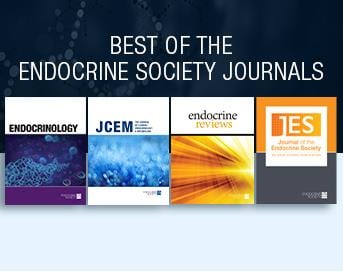Mary Elizabeth Patti, MD, is an Investigator at Joslin Diabetes Center, Director of the Hypoglycemia Clinic, Co-Director of the Molecular Phenotyping Core, and Associate Professor of Medicine at Harvard Medical School. Dr. Patti’s NIH-funded laboratory studies are focused on identification of molecular and epigenetic mechanisms by which environmental/nutritional risk factors during early life confer risk for diabetes. Her laboratory utilizes cellular and animal models to study how parental and early-life exposures impact the epigenome and impact diabetes risk in subsequent generations. Clinical/translational studies are focused on the role of the intestine as a mediator of systemic glucose metabolism and its alterations after bariatric surgery, and the development of novel approaches to treatment of post-bariatric hypoglycemia.
What is your favorite Endocrine Society memory?
I have clear memories of attending my first meeting as an endocrine fellow, when the ADA and ENDO meetings were held back-to-back in San Francisco. I was so excited to be able to shop in the proverbial endocrine "candy store" to decide which talks by endocrine masters I should attend. (Corny but true!)
What advice would you give for someone looking to become more involved in the Endocrine Society?
I would recommend attending the annual meeting in person when possible and reaching out to volunteer for meeting planning and other committees.
How has the Endocrine Society supported your professional development/career journey?
The Endocrine Society has provided an important forum for presenting our work in the area of post-bariatric hypoglycemia, both at national meetings, continuing education meetings, and in print in JCEM. I was also honored to coauthor a review in Endocrine Reviews.
What do you like to do in your spare time?
I love spending time with my family - very supportive husband and 3 children, now in college and beyond. I love to take long walks in the woods with our hound dog, cuddle with our 5 (!) cats, explore tide pools, and travel to far-off destinations (when permissible). I read voraciously - both science, clinical medicine, and even non-work books.
If you could ask your peers in Endocrinology one question, what would it be?
I would like to start a discussion about how we can engage physicians and scientists-in-training to convey the rewards of endocrinology and diabetes-related practice and research. Sometimes in the day to day challenges it is easy to forget how lucky we are to be able to care for patients and perform research in such an exciting and important specialty.
Is there anything else you would like to share?
One of my favorite books which I recommend to aspiring endocrinologists is Informed Consent by Neil Ravin - it really underscores the excitement and reward of endocrine diagnostic / detective work.
To learn more about Dr. Patti’s research published in JCEM, check out the Endocrine Feedback Loop Podcast, episode 015- Hypoglycemia After Gastric Bypass. Once you are caught up, check out the follow-up Bench to Podcast episode: Interview with the Researcher. Dr. Patti discusses how she and her co-authors selected their research topic, factors considered while developing their approach, and decisions they had to make as researchers.

Get published in our top-ranked, peer-reviewed journals. Visit our journals page to learn why you should publish with the Endocrine Society, review our author guidelines, and learn how to submit your research for publication.